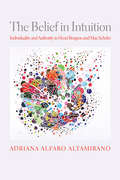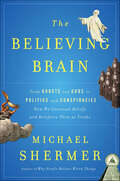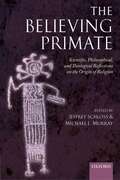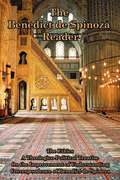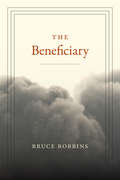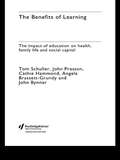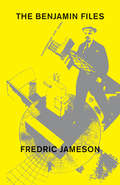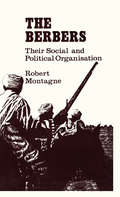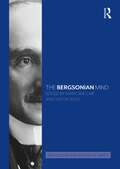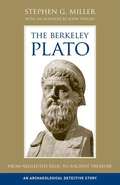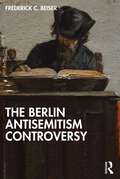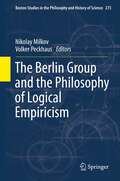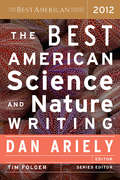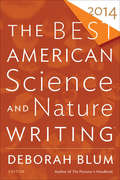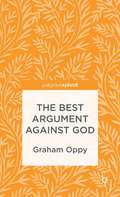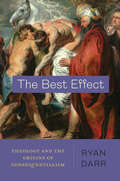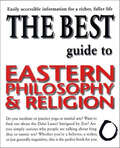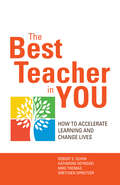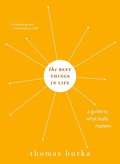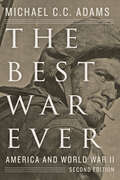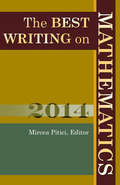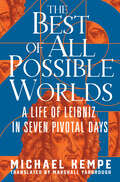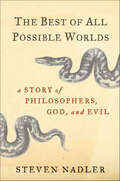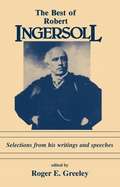- Table View
- List View
The Belief in Intuition: Individuality and Authority in Henri Bergson and Max Scheler (Intellectual History of the Modern Age)
by Adriana Alfaro AltamiranoWithin the Western tradition, it was the philosophers Henri Bergson and Max Scheler who laid out and explored the nonrational power of "intuition" at work in human beings that plays a key role in orienting their thinking and action within the world. As author Adriana Alfaro Altamirano notes, Bergon's and Scheler's philosophical explorations, which paralleled similar developments by other modernist writers, artists, and political actors of the early twentieth century, can yield fruitful insights into the ideas and passions that animate politics in our own time.The Belief in Intuition shows that intuition (as Bergson and Scheler understood it) leads, first and foremost, to a conception of freedom that is especially suited for dealing with hierarchy, uncertainty, and alterity. Such a conception of freedom is grounded in a sense of individuality that remains true to its "inner multiplicity," thus providing a distinct contrast to and critique of the liberal notion of the self.Focusing on the complex inner lives that drive human action, as Bergson and Scheler did, leads us to appreciate the moral and empirical limits of liberal devices that mean to regulate our actions "from the outside." Such devices, like the law, may not only carry pernicious effects for freedom but, more troublingly, oftentimes "erase their traces," concealing the very ways in which they are detrimental to a richer experience of subjectivity.According to Alfaro Altamirano, Bergson's and Scheler's conception of intuition and personal authority puts contemporary discussions about populism in a different light: It shows that liberalism would only at its own peril deny the anthropological, moral, and political importance of the bearers of charismatic authority. Personal authority thus understood relies on a dense, but elusive, notion of personality, for which personal authority is not only consistent with freedom, but even contributes to it in decisive ways.
The Believing Brain: From Ghosts and Gods to Politics and Conspiracies—How We Construct Beliefs and Reinforce Them as Truths
by Michael Shermer“A wonderfully lucid, accessible, and wide-ranging account of the boundary between justified and unjustified belief.” —Sam Harris, New York Times–bestselling author of The Moral Landscape and The End of FaithIn this work synthesizing thirty years of research, psychologist, historian of science, and the world’s best-known skeptic Michael Shermer upends the traditional thinking about how humans form beliefs about the world. Simply put, beliefs come first and explanations for beliefs follow. The brain, Shermer argues, is a belief engine. From sensory data flowing in through the senses, the brain naturally begins to look for and find patterns, and then infuses those patterns with meaning. Our brains connect the dots of our world into meaningful patterns that explain why things happen, and these patterns become beliefs. Once beliefs are formed the brain begins to look for and find confirmatory evidence in support of those beliefs, which accelerates the process of reinforcing them, and round and round the process goes in a positive-feedback loop of belief confirmation. Shermer outlines the numerous cognitive tools our brains engage to reinforce our beliefs as truths.Interlaced with his theory of belief, Shermer provides countless real-world examples of how this process operates, from politics, economics, and religion to conspiracy theories, the supernatural, and the paranormal. Ultimately, he demonstrates why science is the best tool ever devised to determine whether or not a belief matches reality.“A must read for everyone who wonders why religious and political beliefs are so rigid and polarized—or why the other side is always wrong, but somehow doesn’t see it.” —Dr. Leonard Mlodinow, physicist and author of The Drunkard’s Walk and The Grand Design (with Stephen Hawking)
The Believing Primate: Scientific, Philosophical, and Theological Reflections on the Origin of Religion
by Michael Murray Jeffrey SchlossOver the last two decades, scientific accounts of religion have received a great deal of scholarly and popular attention both because of their intrinsic interest and because they are widely as constituting a threat to the religion they analyse. The Believing Primate aims to describe and discuss these scientific accounts as well as to assess their implications. The volume begins with essays by leading scientists in the field, describing these accounts and discussing evidence in their favour. Philosophical and theological reflections on these accounts follow, offered by leading philosophers, theologians, and scientists. This diverse group of scholars address some fascinating underlying questions: Do scientific accounts of religion undermine the justification of religious belief? Do such accounts show religion to be an accidental by-product of our evolutionary development? And, whilst we seem naturally disposed toward religion, would we fare better or worse without it? Bringing together dissenting perspectives, this provocative collection will serve to freshly illuminate ongoing debate on these perennial questions.
The Benedict de Spinoza Reader
by Benedict De SpinozaBenedict de Spinoza's writings laid the groundwork for the 18th century Enlightenment and for modern Biblical criticism. By virtue of his magnum opus, the Ethics, Spinoza is considered one of Western philosophy's definitive ethicists. Men would never be superstitious, if they could govern all their circumstances by set rules, or if they were always favoured by fortune: but being frequently driven into straits where rules are useless, and being often kept fluctuating pitiably between hope and fear by the uncertainty of fortune's greedily coveted favours, they are consequently, for the most part, very prone to credulity. The human mind is readily swayed this way or that in times of doubt, especially when hope and fear are struggling for the mastery, though usually it is boastful, over-confident, and vain. After experience had taught me that all the usual surroundings of social life are vain and futile; seeing that none of the objects of my fears contained in themselves anything either good or bad, except in so far as the mind is affected by them, I finally resolved to inquire whether there might be some real good having power to communicate itself, which would affect the mind singly, to the exclusion of all else: whether, in fact, there might be anything of which the discovery and attainment would enable me to enjoy continuous, supreme, and unending happiness. Spinoza was one of the great rationalists of 17th century philosophy. He helped lay the groundwork for the 18th century Enlightenment and modern biblical criticism. His correspondence helps shed light on his ethical opinions and positions. Required reading for those who wish a deeper understanding of the writings of Benedict de Spinoza.
The Beneficiary
by Bruce RobbinsFrom iPhones and clothing to jewelry and food, the products those of us in the developed world consume and enjoy exist only through the labor and suffering of countless others. In his new book Bruce Robbins examines the implications of this dynamic for humanitarianism and social justice. He locates the figure of the "beneficiary" in the history of humanitarian thought, which asks the prosperous to help the poor without requiring them to recognize their causal role in the creation of the abhorrent conditions they seek to remedy. Tracing how the beneficiary has manifested itself in the work of George Orwell, Virginia Woolf, Jamaica Kincaid, Naomi Klein, and others, Robbins uncovers a hidden tradition of economic cosmopolitanism. There are no easy answers to the question of how to confront systematic inequality on a global scale. But the first step, Robbins suggests, is to acknowledge that we are, in fact, beneficiaries.
The Benefits of Learning: The Impact of Education on Health, Family Life and Social Capital
by John Preston John Bynner Tom Schuller Cathie Hammond Angela Brassett-GrundyHow do education and learning really impact on people's lives?The Benefits of Learning is a detailed, systematic and vivid account of the impact of formal and informal education on people's lives. Based on extended interviews with adults of all ages, it shows how learning affects their health, family lives and participation in civic life, revealing the downsides of education as well as the benefits. At a time when education is in danger of being narrowly regarded as an instrument of economic growth, this study covers:* the interaction between learning and people's physical and psychological well-being* the way learning impacts on family life and communication between generations* the effect on people's ability and motivation to take part in civic and community life.Packed with detail from adults' own accounts of their lives, the book reveals how learning enables people to sustain themselves and their communities in the face of daily stresses and strains, as well as sometimes transforming their lives. The book opens up new avenues for debate. It is a valuable resource for education researchers and of particular interest to education policy makers, adult education practitioners, health educators and postgraduate students in education.
The Benjamin Files
by Fredric JamesonJameson's first full-length engagement with Walter Benjamin's workThe Benjamin Files offers a comprehensive new reading of all of Benjamin's major works and a great number of his shorter book reviews, notes and letters. Its premise is that Benjamin was an anti-philosophical, anti-systematic thinker whose conceptual interests also felt the gravitational pull of his vocation as a writer. What resulted was a coexistence or variety of language fields and thematic codes which overlapped and often seemed to contradict each other: a view which will allow us to clarify the much-debated tension in his works between the mystical or theological side of Benjamin and his political or historical inclination. The three-way tug of war over his heritage between adherents of his friends Scholem, Adorno and Brecht, can also be better grasped from this position, which gives the Brechtian standpoint more due than most influential academic studies. Benjamin's corpus is an anticipation of contemporary theory in the priority it gives language and representation over philosophical or conceptual unity; and its political motivations are clarified by attention to the omnipresence of History throughout his writing, from the shortest articles to the most ambitious projects. His explicit program - "to transfer the crisis into the heart of language" or, in other words, to detect class struggle at work in the most minute literary phenomena - requires the reader to translate the linguistic or representational literary issues that concerned him back into the omnipresent but often only implicitly political ones. But the latter are those of another era, to which we must gain access, to use one of Benjamin's favorite expressions.
The Berbers: Their Social and Political Organisation (Routledge Revivals Ser.)
by Robert MontagneFrance entered the North African world in 1830. Its overt political role there ended in 1962. The interpenetration of cultures and languages which resulted from the colonial conquest has not ended yet. No doubt a time will come when an intellectual balance sheet of this epoch comes to be drawn up. When this is done, Robert Montagne’s name will head the list of those Frenchmen who have made a study of Berber society. The brilliance of his ideas, the thoroughness and perceptiveness of his documentation, the range of his historical and comparative vision, and (a trait not always found in scholarly writing on North Africa) the simplicity and vigour of his style, all help to make plain that we have here a social thinker and observer of the very first rank, and one who deserves to be far better known outside the French-speaking world than he is at present.
The Bergsonian Mind (Routledge Philosophical Minds)
by Mark SinclairHenri Bergson (1859–1941) is widely regarded as one of the most original and important philosophers of the twentieth century. His work explored a rich panoply of subjects, including time, memory, free will and humour and we owe the popular term élan vital to a fundamental insight of Bergson’s. His books provoked responses from some of the leading thinkers and philosophers of his time, including Albert Einstein, William James and Bertrand Russell, and he is acknowledged as a fundamental influence on Marcel Proust. The Bergsonian Mind is an outstanding, wide-ranging volume covering the major aspects of Bergson’s thought, from his early influences to his continued relevance and legacy. Thirty-six chapters by an international team of leading Bergson scholars are divided into five clear parts: Sources and Scene Mind and World Ethics and Politics Reception Bergson and Contemporary Thought. In these sections fundamental topics are examined, including time, freedom and determinism, memory, perception, evolutionary theory, pragmatism and art. Bergson’s impact beyond philosophy is also explored in chapters on Bergson and spiritualism, physics, biology, cinema and post-colonial thought. An indispensable resource for anyone in Philosophy studying and researching Bergson’s work, The Bergsonian Mind will also interest those in related disciplines, such as Literature, Religion, Sociology and French Studies.
The Berkeley Plato: An Archaeological Detective Story
by Stephen G. MillerThis book explores the provenance of the so-called Berkeley Herm of Plato, a sculptural portrait that Stephen G. Miller first encountered over thirty years ago in a university storage basement.
The Berlin Antisemitism Controversy
by Frederick C. BeiserAfter a long struggle, Jewish emancipation was formally completed in Germany in 1871, when Wilhelm I abolished religious discrimination across the entire Reich. Yet the very same decade witnessed a new wave of antisemitism, one more vicious and virulent than anything before. At its centre was what is known as ‘The Berlin Antisemitism Controversy’. How can this rise of antisemitism be explained when further liberal reform was expected? Can it help us understand the tide of antisemitism that was to engulf Germany fifty years later?In this outstanding book by a leading scholar of German philosophy, Frederick C. Beiser argues that to understand modern antisemitism we must go back in history. Beginning with the background of the controversy and examining the most important antisemitic thinkers of the 1870s and 1880s, he brilliantly analyses the beginnings of modern antisemitism in Germany. Beiser challenges received scholarship that the rise of antisemitism was caused by a failure of the Jews to assimilate and criticises the view, held by Hannah Arendt, that antisemitism was at its peak when Jews were perceived to be powerless and had lost their roles in government and finance. He argues instead that it was fuelled by a fear of Jewish domination that took multiple forms. Exploring antisemitism from both a historical and philosophical perspective, he situates antisemitism in relation to such fundamental questions as the conditions for citizenship in the modern state, what is meant by nationality and what role religion should play in the state. He also vividly and expertly analyses the writings and arguments of those involved in the antisemitism crisis of the 1870s, including Wilhelm Marr, Constantin Frantz and Adolf Treitschke and thinkers who are here examined in English for the first time.The Berlin Antisemitism Controversy sheds much-needed light on an episode whose shockwaves resonate today. It is a superb account of a crucial period of not only German but also European and Jewish history and essential reading for anyone interested in the causes and roots of antisemitism in Germany and beyond.
The Berlin Group and the Philosophy of Logical Empiricism
by Nikolay Milkov Volker PeckhausThe Berlin Group for scientific philosophy was active between 1928 and 1933 and was closely related to the Vienna Circle. In 1930, the leaders of the two Groups, Hans Reichenbach and Rudolf Carnap, launched the journal Erkenntnis. However, between the Berlin Group and the Vienna Circle, there was not only close relatedness but also significant difference. Above all, while the Berlin Group explored philosophical problems of the actual practice of science, the Vienna Circle, closely following Wittgenstein, was more interested in problems of the language of science. The book includes first discussion ever (in three chapters) on Walter Dubislav's logic and philosophy. Two chapters are devoted to another author scarcely explored in English, Kurt Grelling, and another one to Paul Oppenheim who became an important figure in the philosophy of science in the USA in the 1940s-1960s. Finally, the book discusses the precursor of the Nord-German tradition of scientific philosophy, Jacob Friedrich Fries.
The Best American Science and Nature Writing 2012 (The Best American Series)
by Sy Montgomery Elizabeth Kolbert Jerome E. Groopman Deborah Blum Rivka Galchen John Seabrook Bijal P. Trivedi Mark McClusky&“Top-notch science writing covering everything from the 1,000 species in the human gut to efforts to reverse-evolve a chicken into a dinosaur.&” —Kirkus Reviews With contributions from bestselling and award-winning writers including Jerome Groopman and Elizabeth Kolbert, this volume delves into such topics as the 2008 &“Black Friday&” stampede at a Long Island Walmart; an annual humans-vs.-AI competition; octopus intelligence; lab-grown meat; marauder ants; the brains of teenagers; and the Neanderthal genome. Lively and accessible, this is &“a showcase for clean, plain-English science and nature writing and a treat for readers&” (Kirkus Reviews). &“This strong collection invites awe, begets wonder, and stimulates contemplation.&” —Publishers Weekly &“There is so much we don&’t know, which leads us to make so many irrational decisions that we need scientists and science writers to share their inquiries and discoveries in welcoming and lucid prose. Stellar examples of just this sort of cogent and compelling writing sustains this invaluable and exciting series.&” —Booklist Contributors include: Brendan Buhler · Virginia Hughes • Jerome Groopman • Carl Zimmer • Thomas Hayden • Michael Behar • Bijal P. Trivedi • Sy Montgomery • Mark W. Moffett • Deborah Blum • Elizabeth Kolbert • Michael Roberts • Thomas Goetz • Jason Daley • David Dobbs • David Eagleman • John Seabrook • David Kirby • Robert Kunzig • Michael Specter • Mark McClusky • Rivka Galchen • Joshua Davis • Brian Christian
The Best American Science and Nature Writing 2014 (The Best American Series)
by Barbara Kingsolver Carl Zimmer Elizabeth Kolbert Rebecca Solnit Nicholas Carr Seth Mnookin Fred Pearce E. O. Wilson&“A stimulating compendium&” on topics from antibiotics to animals, featuring Rebecca Solnit, E.O. Wilson, Nicholas Carr, Elizabeth Kolbert, and many more (Kirkus Reviews). &“A consistently strong series . . . Making connections between seemingly unrelated topics can help expand thinking, as seen in the effects of automated navigation on both airplane pilot error and Inuit hunting accidents that Nicholas Carr explores in &‘The Great Forgetting.&’ Sarah Stewart Johnson makes a similar connection between the loss of a 1912 Antarctic expedition and the explosion of the space shuttle Challenger in &‘O-Rings.&’ . . . Essays like Virginia Hughes&’s &‘23 and You&’ investigates the effects of availability of individual genetic information on human interactions, while pieces like Maryn McKenna&’s &‘Imagining the Post-Antibiotics Future&’ and Kate Sheppard&’s &‘Under Water&’ remind us of unpleasant futures which we have in large part created ourselves. But Barbara Kingsolver&’s &‘Where it Begins,&’ a lyrical musing on connectedness, or Wilson&’s optimistic, bug-loving &‘The Rebirth of Gorongosa,&’ reveal that among the strange, shocking, or depressing, there is still unadulterated joy to be found.&” —Publishers Weekly &“Undeniably exquisite . . . meditations that reveal not only how science actually happens but also who or what propels its immutable humanity.&” —Maria Popova, Brain Pickings Contributors include: Katherine Bagley • Nicholas Carr • David Dobbs • Pippa Goldschmidt • Amy Harmon • Robin Marantz Henig • Virginia Hughes • Ferris Jabr • Sarah Stewart Johnson • Barbara J. King • Barbara Kingsolver • Maggie Koerth-Baker • Elizabeth Kolbert • Joshua Lang • Maryn McKenna • Seth Mnookin • Justin Nobel • Fred Pearce • Corey S. Powell • Roy Scranton • Kate Sheppard • Bill Sherwonit • Rebecca Solnit • David Treuer • E.O. Wilson • Carl Zimmer
The Best Argument against God
by Graham Oppy. . . compares two theories-Naturalism and Theism-on a wide range of relevant data. It concludes that Naturalism should be preferred to Theism on that data. The central idea behind the argument is that, while Naturalism is simpler than Theism, there is no relevant data that Naturalism fails to explain at least as well as Theism does.
The Best Effect: Theology and the Origins of Consequentialism
by Ryan DarrA theological history of consequentialism and a fresh agenda for teleological ethics. Consequentialism—the notion that we can judge an action by its effects alone—has been among the most influential approaches to ethics and public policy in the Anglophone world for more than two centuries. In The Best Effect, Ryan Darr argues that consequentialist ethics is not as secular or as rational as it is often assumed to be. Instead, Darr describes the emergence of consequentialism in the seventeenth century as a theological and cosmological vision and traces its intellectual development and eventual secularization across several centuries. The Best Effect reveals how contemporary consequentialism continues to bear traces of its history and proposes in its place a more expansive vision for teleological ethics.
The Best Guide to Eastern Philosophy & Religion: Easily Accessible Information for a Richer, Fuller Life
by Diane MorganThe Best Guide to Eastern Philosophy & Religion provides a thorough discussion of the most widely practiced belief systems of the East. Author Diane Morgan understands how to direct the materialistic, linear way of Western thinking toward a comprehension of the cyclical, metaphysical essence of Eastern philosophy. With an emphasis on the tenets and customs that Western seekers find most compelling, this text is accessible to the novice yet sophisticated enough for the experienced reader.Inside, you'll find complete coverage of Hinduism, Buddhism, Confucianism, and Taoism, as well as the less-widely practiced faiths of Shintoism, Jainism, Sikhism, and Zoroastrianism. Learn the fundamentals of the tantric path to liberation and the relationship between sex and seeking. Discover the true meaning of Feng Shui, the philosophical underpinnings of Hatha Yoga and Taoist connection to the martial art of Tai chi chuan. And if you've ever wondered: what is the sound of one hand clapping?, this book will get you started on finding that answer.The Eastern traditions, with their emphasis on harmony and oneness, have much to offer us in our hectic, demanding lives. For a comprehensive, entertaining exploration of the beliefs of Asia, The Best Guide to Eastern Philosophy & Religion is the essential manual for the seeker in all of us.
The Best Teacher in You: How to Accelerate Learning and Change Lives
by Robert E. Quinn Mike Thomas Katherine Heynoski Gretchen M. SpreitzerWhat does teaching look like at its very best? How are great teachers able to ignite a love of learning and change students’ lives? In this book you’ll learn from seven remarkable teachers who stretch beyond the conventional foundations of good teaching to transform their classrooms into exciting, dynamic places where teachers and students cocreate the learning experience. Based on six years of extensive work, the book outlines a framework that identifies four dimensions of effective teaching and learning that are integrated in these highly effective teachers’ classrooms—and that all teachers can use to recognize and release the potential in themselves and their students.
The Best Things in Life: A Guide to What Really Matters
by Thomas HurkaFor centuries, philosophers, theologians, moralists, and ordinary people have asked: how should we live? What makes for a good life? In 'The Best Things in Life', distinguished philosopher Thomas Hurka takes a fresh look at these perennial questions as they arise for us now in the 21st century.
The Best War Ever: America and World War II (The American Moment)
by Michael C. AdamsThe most readable—and searingly honest—short book ever written on this pivotal conflict.Was World War II really such a "good war"? Popular memory insists that it was, in fact, "the best war ever." After all, we knew who the enemy was, and we understood what we were fighting for. The war was good for the economy. It was liberating for women. A battle of tanks and airplanes, it was a "cleaner" war than World War I. Although we did not seek the conflict—or so we believed—Americans nevertheless rallied in support of the war effort, and the nation's soldiers, all twelve million of them, were proud to fight. But according to historian Michael C. C. Adams, our memory of the war era as a golden age is distorted. It has left us with a misleading—even dangerous—legacy, one enhanced by the nostalgia-tinged retrospectives of Stephen E. Ambrose and Tom Brokaw. Disputing many of our common assumptions about the period, Adams argues in The Best War Ever that our celebratory experience of World War II is marred by darker and more sordid realities. In the book, originally published in 1994, Adams challenges stereotypes to present a view of World War II that avoids the simplistic extremes of both glorification and vilification. The Best War Ever charts the complex diplomatic problems of the 1930s and reveals the realities of ground combat: no moral triumph, it was in truth a brutal slog across a blasted landscape. Adams also exposes the myth that the home front was fully united behind the war effort, demonstrating how class, race, gender, and age divisions split Americans. Meanwhile, in Europe and Asia, shell-shocked soldiers grappled with emotional and physical trauma, rigorously enforced segregation, and rampant venereal disease.In preparing this must-read new edition, Adams has consulted some seventy additional sources on topics as varied as the origins of Social Security and a national health system, the Allied strategic bombing campaign, and the relationship of traumatic brain injuries to the adjustment problems of veterans. The revised book also incorporates substantial developments that have occurred in our understanding of the course and character of the war, particularly in terms of the human consequences of fighting. In a new chapter, "The Life Cycle of a Myth," Adams charts image-making about the war from its inception to the present. He contrasts it with modern-day rhetoric surrounding the War on Terror, while analyzing the real-world consequences that result from distorting the past, including the dangerous idea that only through (perpetual) military conflict can we achieve lasting peace.
The Best Writing on Mathematics 2014
by Mircea PiticiThis annual anthology brings together the year's finest mathematics writing from around the world. Featuring promising new voices alongside some of the foremost names in the field, The Best Writing on Mathematics 2014 makes available to a wide audience many articles not easily found anywhere else—and you don’t need to be a mathematician to enjoy them. These writings offer surprising insights into the nature, meaning, and practice of mathematics today. They delve into the history, philosophy, teaching, and everyday occurrences of math, and take readers behind the scenes of today’s hottest mathematical debates. Here John Conway presents examples of arithmetical statements that are almost certainly true but likely unprovable; Carlo Séquin explores, compares, and illustrates distinct types of one-sided surfaces known as Klein bottles; Keith Devlin asks what makes a video game good for learning mathematics and shows why many games fall short of that goal; Jordan Ellenberg reports on a recent breakthrough in the study of prime numbers; Stephen Pollard argues that mathematical practice, thinking, and experience transcend the utilitarian value of mathematics; and much, much more.In addition to presenting the year’s most memorable writings on mathematics, this must-have anthology includes an introduction by editor Mircea Pitici. This book belongs on the shelf of anyone interested in where math has taken us—and where it is headed.
The Best of All Possible Worlds: A Life of Leibniz in Seven Pivotal Days
by Michael KempeA biography of the polymath Gottfried Wilhelm Leibniz told through seven critical days spanning his life and revealing his contributions to our modern world. Gottfried Wilhelm Leibniz (1646–1716) was the Benjamin Franklin of Europe, a “universal genius” who ranged across many fields and made breakthroughs in most of them. Leibniz invented calculus (independently from Isaac Newton), conceptualized the modern computer, and developed the famous thesis that the existing world is the best that God could have created. In The Best of All Possible Worlds, historian and Leibniz expert Michael Kempe takes us on a journey into the mind and inventions of a man whose contributions are perhaps without parallel in human history. Structured around seven crucial days in Leibniz’s life, Kempe’s account allows us to observe him in the act of thinking and creating, and gives us a deeper understanding of his broad-reaching intellectual endeavors. On October 29, 1675, we find him in Paris, diligently working from his bed amid a sea of notes, and committing the integral symbol—the basis of his calculus—to paper. On April 17, 1703, Leibniz is in Berlin, writing a letter reporting that a Jesuit priest living in China has discovered how to use Leibniz’s binary number system to decipher an ancient Chinese system of writing. One day in August 1714, Leibniz enjoys a Viennese coffee while drawing new connections among ontology and biology and mathematics. The Best of All Possible Worlds transports us to an age defined by rational optimism and a belief in progress, and will endure as one of the few authoritative accounts of Leibniz’s life available in English.
The Best of All Possible Worlds: A Story of Philosophers, God, and Evil
by Steven NadlerIn the spring of 1672, the German philosopher and mathematician Gottfried Wilhelm Leibniz arrived in Paris on a furtive diplomatic mission. That project was abandoned quickly, but Leibniz remained in Paris with a singular goal: to get the most out of the city's intellectual and cultural riches. He benefited, above all, from his friendships with France's two greatest philosopher-theologians of the period, Antoine Arnauld and Nicolas de Malebranche. The interactions of these three men would prove of great consequence not only for Leibniz's own philosophy but for the development of modern philosophical and religious thought. Despite their wildly different views and personalities, the three philosophers shared a single, passionate concern: resolving the problem of evil. Why is it that, in a world created by an allpowerful, all-wise, and infinitely just God, there is sin and suffering? Why do bad things happen to good people, and good things to bad people? This is the story of a clash between radically divergent worldviews. But it is also a very personal story. At its heart are the dramatic—and often turbulent—relationships between three brilliant and resolute individuals. In this lively and engaging book, Steven Nadler brings to life a debate that obsessed its participants, captivated European intellectuals, and continues to inform our ways of thinking about God, morality, and the world.
The Best of Robert Ingersoll: Selections from His Writings and Speeches
by Robert G. Ingersoll Roger E. GreeleySelected quotations and a few speeches of the noted 19th century American orator, freethinker and agnostic, Robert Ingersoll. His pleas for civil rights, the rights of women and children, responsible and responsive government, and individual freedom of conscience and religious belief have placed him in the vanguard of enlightened thinkers. Today the legacy of Robert Ingersoll, prophet and pioneer, merits the attention of anyone who espouses humane, liberal, rational, or agnostic opinions.
The Best of the Best: Becoming Elite at an American Boarding School
by Rubén A. Gaztambide-FernándezFor two years, Rubén Gaztambide-Fernández shared the life of what he calls the “Weston School,” an elite New England boarding school. He sat in on classes, ate meals in the dining halls, cheered at sporting events, hung out in dorms while students baked cookies or celebrated birthdays. And through it all, observing the experiences of a diverse group of students, conducting interviews and focus groups, he developed a nuanced portrait of how these students make sense of their extraordinary good fortune in attending the school. Vividly describing the pastoral landscape and graceful buildings, the rich variety of classes and activities, and the official and unofficial rules that define the school, The Best of the Best reveals a small world of deeply ambitious, intensely pressured students. Some are on scholarship, others have never met a public school student, but all feel they have earned their place as a “Westonian” by being smart and working hard. Weston is a family, they declare, with a niche for everyone, but the hierarchy of coolness—the way in which class, race, sexism, and good looks can determine one’s place—is well known. For Gaztambide-Fernández, Weston is daunting yet strikingly bucolic, inspiring but frustratingly incurious, and sometimes—especially for young women—a gilded cage for a gilded age. “Would you send your daughter here?” one girl asks him, and seeing his hesitation asks, “Because you love her?”
